Don't Forget Privilege
Recently I've sensitivity read manuscripts and I've been noticed characters with unacknowledged privilege and it needs to be addressed. Privilege extends far beyond the advantages of being a "straight white male." Class, able-bodiedness, religion, immigration status, sexual orientation, and so many more categories can be areas where people benefit from privilege.
It's important for writers to understand and address privilege in their stories because literature is as a mirror and window of society. People benefit from and are oppressed by the privileges they have or lack, therefore, so do your characters. The way your characters behave, interact, and move about in the setting are affected by their privilege or the lack thereof.
Know your character's privileges
This is connected to world building. If you've created a world from scratch it is tricky to determine the privileges but doing so is a great exercise in making your world more robust and authentic.
If your story is set in the United States this is pretty easy, a Google search can help you make sense of all the obvious and not so obvious areas where privilege exists, and this will be similar in all Western states (with adjustments made for culture and history).
Consider what the social power structure is in your setting. What has historically been the majority, favored, and "normal" existence? Determine which characteristics and attributes your characters have that are in line with or deviates from the social power structure in the setting.
This chart is a great tool to see the myriad of areas of a person's identity and how they fall on an axis privilege/norms to oppressed in Western cultures. If your setting is not in the West it's a great way to define the categories and decide what is considered dominant in the culture of your story.
Source: Judge Me Not
How does this manifest in your story?
I sensitivity read a manuscript with main character who was a thief. He stole things that were long forgotten by the living and not necessarily valuable on the surface but as a natural resource was valuable. The writer wanted the character's race to be ambiguous (which I always advise against for anything but cameo characters) but in this case, the character's race and and other access points to privilege were extremely important to the way this character would behave.
Setting: contemporary southern United States
Character: a young man who steals out in the open while wearing a hoodie
If he were white, non-immigrant, and fluent in English, his fear of being perceived as suspicious, and inherently dangerous, is starkly different than if the character was on the opposite end of the privilege axis. His idea of what his punishment would be if he were caught would be a factor for him to determine if the crime was worth committing.
Would this character wear a hoodie and steal out in the open if he were a Native teen or Latinx immigrant? What would be his internal or external concerned about getting caught, arrested, deported, or even killed by the police (or citizen watchdog)? How would he avoid or mitigate those possibilities? Would it even be worth the money?
As you can see in this example race, citizenship status, and what he's wearing all matter because his relationship to privilege can dictate everything to how he steals to if he wrestles with stealing and not just for the sake of morality.
Your character does not behave in a vacuum, the setting has rules and in those rules, you need to account for the privileges your character has or lacks. The character itself does not need to acknowledge or even be aware of their privileges but that doesn't mean they don't exist. You as a write acknowledging and plotting accordingly will only make your work more authentic and genuine.
Privilege isn't easy to determine especially if you hold many of the attributes of the dominate culture. Taking a long hard look at your character's privileges may also shine a light on your own. Get a sensitivity reader, they are more in tuned with living outside of privilege and how that affects daily life, decision making, and behavior.

